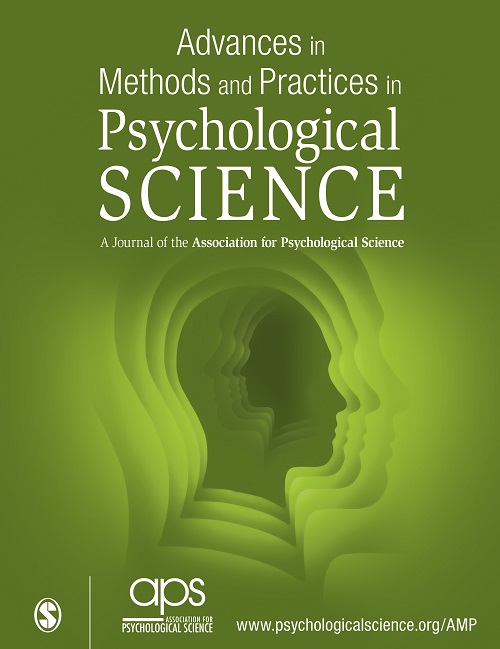Evaluating the Pedagogical Effectiveness of Study Preregistration in the Undergraduate Dissertation
IF 13.4
1区 心理学
Q1 PSYCHOLOGY
Advances in Methods and Practices in Psychological Science
Pub Date : 2023-10-01
DOI:10.1177/25152459231202724
引用次数: 0
Abstract
Research shows that questionable research practices (QRPs) are present in undergraduate final-year dissertation projects. One entry-level Open Science practice proposed to mitigate QRPs is “study preregistration,” through which researchers outline their research questions, design, method, and analysis plans before data collection and/or analysis. In this study, we aimed to empirically test the effectiveness of preregistration as a pedagogic tool in undergraduate dissertations using a quasi-experimental design. A total of 89 UK psychology students were recruited, including students who preregistered their empirical quantitative dissertation (n = 52; experimental group) and students who did not (n = 37; control group). Attitudes toward statistics, acceptance of QRPs, and perceived understanding of Open Science were measured both before and after dissertation completion. Exploratory measures included capability, opportunity, and motivation to engage with preregistration, measured at Time 1 only. This study was conducted as a Registered Report; Stage 1 protocol: https://osf.io/9hjbw (date of in-principle acceptance: September 21, 2021). Study preregistration did not significantly affect attitudes toward statistics or acceptance of QRPs. However, students who preregistered reported greater perceived understanding of Open Science concepts from Time 1 to Time 2 compared with students who did not preregister. Exploratory analyses indicated that students who preregistered reported significantly greater capability, opportunity, and motivation to preregister. Qualitative responses revealed that preregistration was perceived to improve clarity and organization of the dissertation, prevent QRPs, and promote rigor. Disadvantages and barriers included time, perceived rigidity, and need for training. These results contribute to discussions surrounding embedding Open Science principles into research training.评估本科生毕业论文预注册学习的教学效果
研究表明,本科生毕业论文项目中存在可疑研究实践(QRPs)。为减少 QRPs 而提出的一种入门级开放科学实践是 "研究预注册",即研究人员在数据收集和/或分析之前概述其研究问题、设计、方法和分析计划。在本研究中,我们旨在通过准实验设计,实证检验预注册作为本科生毕业论文教学工具的有效性。我们共招募了 89 名英国心理学专业学生,其中包括预注册实证定量论文的学生(n = 52;实验组)和未注册的学生(n = 37;对照组)。在毕业论文完成前后,对学生的统计态度、QRP 的接受程度以及对开放科学的理解进行了测量。探索性测量包括参与预注册的能力、机会和动机,仅在时间 1 进行测量。本研究作为注册报告进行;第一阶段协议:https://osf.io/9hjbw(原则上接受日期:2021 年 9 月 21 日)。研究的预注册并没有明显影响对统计学的态度或对 QRP 的接受程度。然而,与未进行预注册的学生相比,预注册的学生在时间 1 到时间 2 期间对开放科学概念的理解程度更高。探索性分析表明,预注册的学生在能力、机会和动机方面都明显优于预注册的学生。定性回答显示,预注册被认为可以提高论文的清晰度和条理性,防止质量问题,并促进论文的严谨性。不利因素和障碍包括时间、僵化感和培训需求。这些结果有助于围绕将开放科学原则纳入研究培训展开讨论。
本文章由计算机程序翻译,如有差异,请以英文原文为准。
求助全文
约1分钟内获得全文
求助全文
来源期刊
CiteScore
21.20
自引率
0.70%
发文量
16
期刊介绍:
In 2021, Advances in Methods and Practices in Psychological Science will undergo a transition to become an open access journal. This journal focuses on publishing innovative developments in research methods, practices, and conduct within the field of psychological science. It embraces a wide range of areas and topics and encourages the integration of methodological and analytical questions.
The aim of AMPPS is to bring the latest methodological advances to researchers from various disciplines, even those who are not methodological experts. Therefore, the journal seeks submissions that are accessible to readers with different research interests and that represent the diverse research trends within the field of psychological science.
The types of content that AMPPS welcomes include articles that communicate advancements in methods, practices, and metascience, as well as empirical scientific best practices. Additionally, tutorials, commentaries, and simulation studies on new techniques and research tools are encouraged. The journal also aims to publish papers that bring advances from specialized subfields to a broader audience. Lastly, AMPPS accepts Registered Replication Reports, which focus on replicating important findings from previously published studies.
Overall, the transition of Advances in Methods and Practices in Psychological Science to an open access journal aims to increase accessibility and promote the dissemination of new developments in research methods and practices within the field of psychological science.

 求助内容:
求助内容: 应助结果提醒方式:
应助结果提醒方式:


